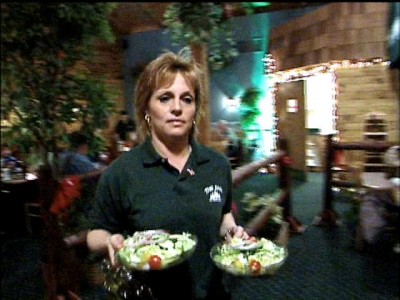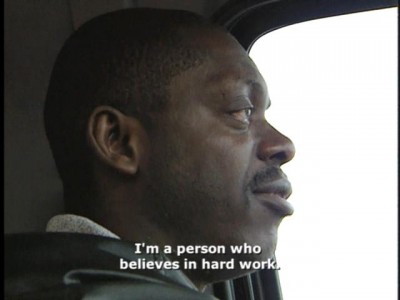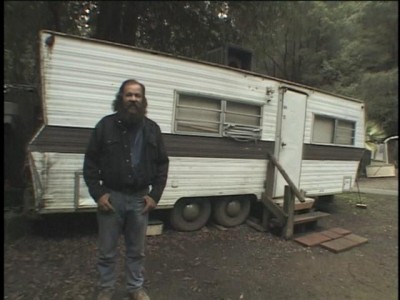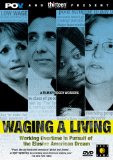| Reviews & Columns |
|
Reviews DVD TV on DVD Blu-ray 4K UHD International DVDs In Theaters Reviews by Studio Video Games Features Collector Series DVDs Easter Egg Database Interviews DVD Talk Radio Feature Articles Columns Anime Talk DVD Savant Horror DVDs The M.O.D. Squad Art House HD Talk Silent DVD
|
DVD Talk Forum |
|
|
| Resources |
|
DVD Price Search Customer Service #'s RCE Info Links |
|
Columns
|
|
|
Waging a Living
Ironweed Film Club // Unrated // January 1, 2009
List Price: $19.95 [Buy now and save at Ironweedfilms]
The Films:
A few years ago journalist Barbara Ehrenreich wrote a book that caused a lot of controversy: Nickel and Dimed: On (Not) Getting by in
The January 2009 Ironweed Film Club disc1 that answers that argument forcefully and thoroughly. Waging a Living, the feature film, and the two shorts also included on the disc look at the working poor in

Waging a Living (85 minutes): Is it possible to work hard in

The one thing that all of these people have in common is that they work very hard and very long. All of them at one time or another mention that the way they get by is through working overtime, but even with the extra money in their paycheck it's nearly impossible to make ends meet. When Barbara puts in three days of overtime during a two week period, the extra money she made disappears when her son needs two prescriptions that total $195. The situation is even worse for Jean (none of these people have health insurance of course) and her daughter. Bridget has to rely on health clinics and other low-cost medical options. While her type of cancer has a very large survival rate, her prognosis is very poor since it took so long to diagnose the problem.

All of these people see education as a way out of poverty, but that path is long and hard and doesn't often give the results that one expects. It's incredibly hard for these people to attend classes, Jean, admits that she's just too old and tired to add class work to her 40+ hour job along with taking care of four young kids and a dying daughter, but some of them do. The most successful is Barbara, who takes night classes at a local community college and eventually gets her associates degree. But, when she leaves her $8.50/hour job and finds employment at $11/hour she runs into trouble. The extra pay gives her an extra $450/month, but she no longer qualifies for many services she was receiving. Her subsidized rent goes up $150/month; she looses her children's Medicaid, food stamps, and utility assistance. When all is said and done she's sliding backwards, the raise having cost her $600/month in benefits.
The heart-wrenching thing about this documentary is how often the people who are profiled slide backwards. Jerry looses his job and finds another one without too much trouble, but at $2/hour less than he was making. The union contract guarantees that he'll get a $0.25/hour raise every year, but at that rate it'll take him 8 years to be making the same salary he was, and that's not counting what inflation eats up.

These are the people who are trying too. While most of them are on some kind of public assistance none of them have stopped working and taken welfare. These are people who are working full-time and trying to follow the American dream. This is a very powerful documentary that puts to rest the popular myth that the poor are just lazy or stupid.
Rosevelt's Amreica (25 minutes): Rosevelt Henderson is a refugee from

Unhitched (13 minutes): A look at the residents of the Faerie Ring Campground who live in portable trailers, meant to be vacation homes on wheels but are now their year-round housing. These people are right on the edge of being homeless. A step below mobile homes, these trailer dwellers are surviving on the fringe of society. A nice compliment to the other two films.

The DVD:
Audio:
All three of these documentaries come with a two-channel soundtrack. None of them were really exciting, but the dialog was clean and clear. The audio was anchored on the screen and sounded fine.
Video:
These three films were presented with a 1.33:1 aspect ratio, which has been the standard for documentaries for years, though that is changing now. The image looked about average for independent documentaries. There were some minor problems, a little blooming in one or two scenes, and aliasing was evident in the background. Aside from that things looked fine. A nice solid presentation of three nice documentaries.
Extras:
Aside from a trailer for the Ironweed Film Club and a text piece about the organization "Common Cause" there were no extras. That's too bad. I would have been interested in an interview with the director of Waging a Living too hear his thoughts on some of the people he profiled and updates on them would have been appreciated too.
Final Thoughts:
This is the second Ironweed Film Club disc that I've seen, and it is excellent. The movies fit together well and all three show a side to American life that many of us don't get to see. If all of Ironweed's offerings are this good, getting a subscription is a no-brainer. Highly Recommended.
1) Ironweed is a publisher that releases a DVD per month to the members of their film club (much like Film Movement does.) Each of their releases is filled with movies and shorts by independent filmmakers that follow a theme.
|
| Popular Reviews |
| Sponsored Links |
|
|
| Sponsored Links |
|
|
| Release List | Reviews | Shop | Newsletter | Forum | DVD Giveaways | Blu-Ray | Advertise |
|
Copyright 2024 DVDTalk.com All Rights Reserved. Legal Info, Privacy Policy, Terms of Use,
Manage Preferences,
Your Privacy Choices | |||||||












